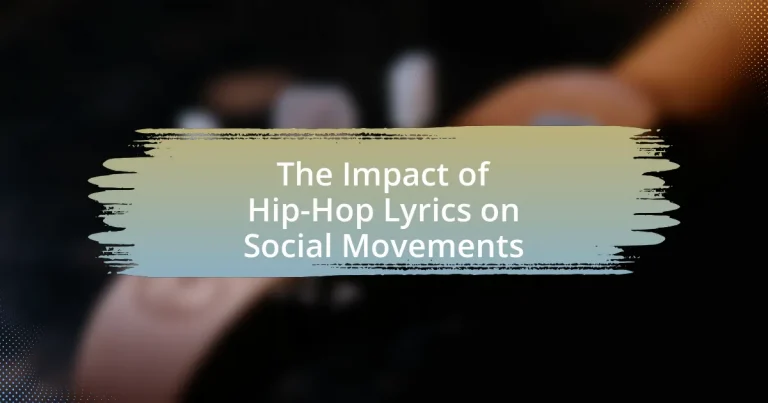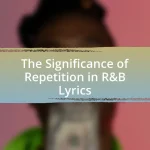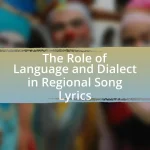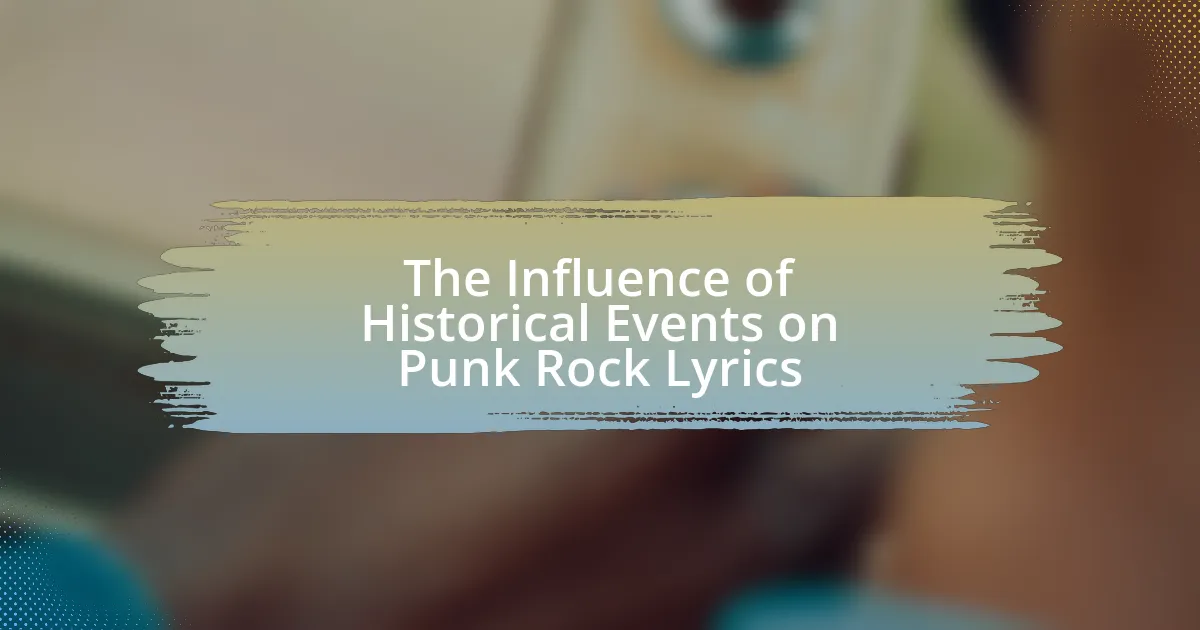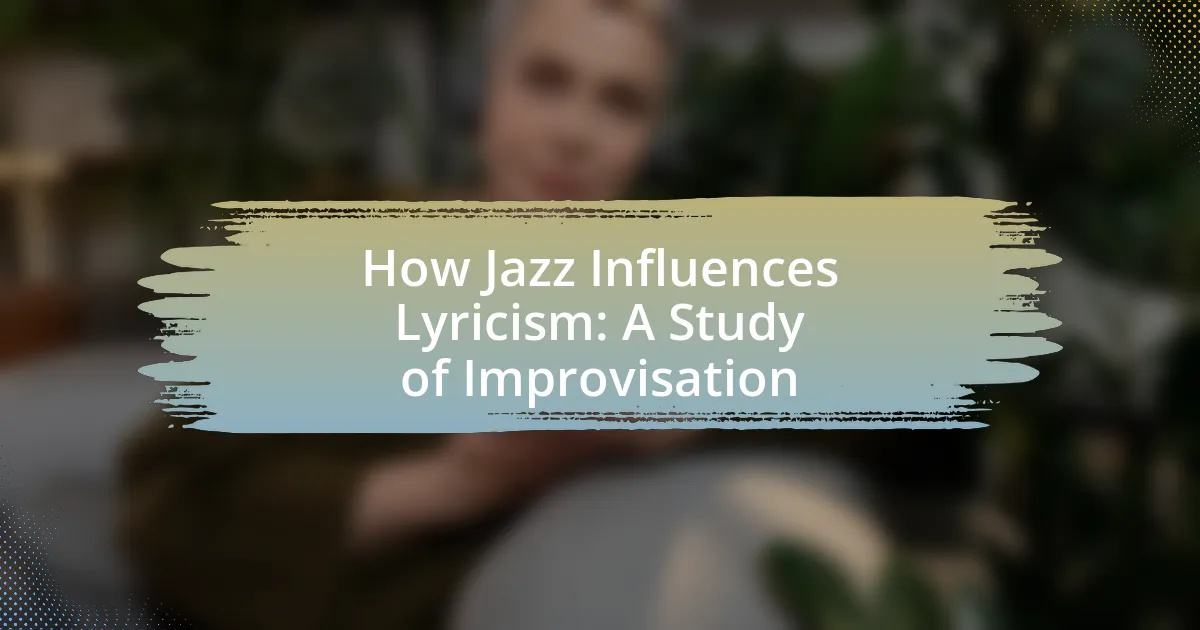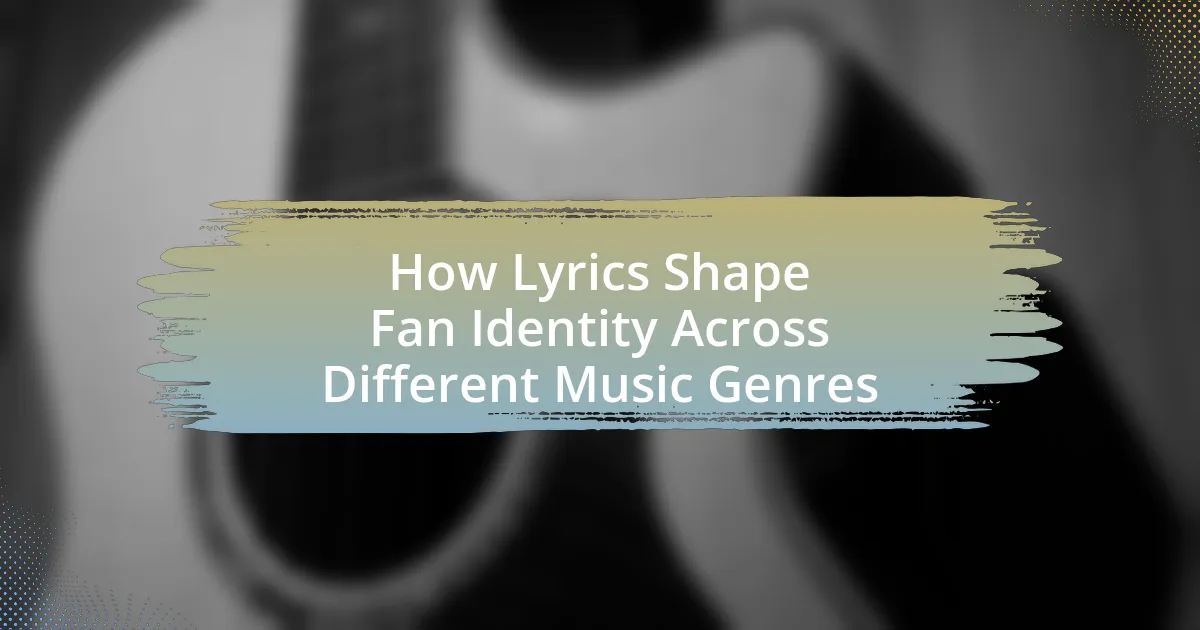The article examines the significant impact of hip-hop lyrics on social movements, highlighting how artists like Kendrick Lamar and Public Enemy address social injustices such as racial inequality and police brutality. It discusses the themes commonly found in hip-hop, including social justice and resilience, and how these themes resonate with movements like Black Lives Matter. The article also explores the historical context of hip-hop, the challenges artists face in promoting social change, and the effectiveness of collaboration with activists to enhance the impact of their messages. Additionally, it emphasizes the role of audience reception and social media in mobilizing communities for activism.
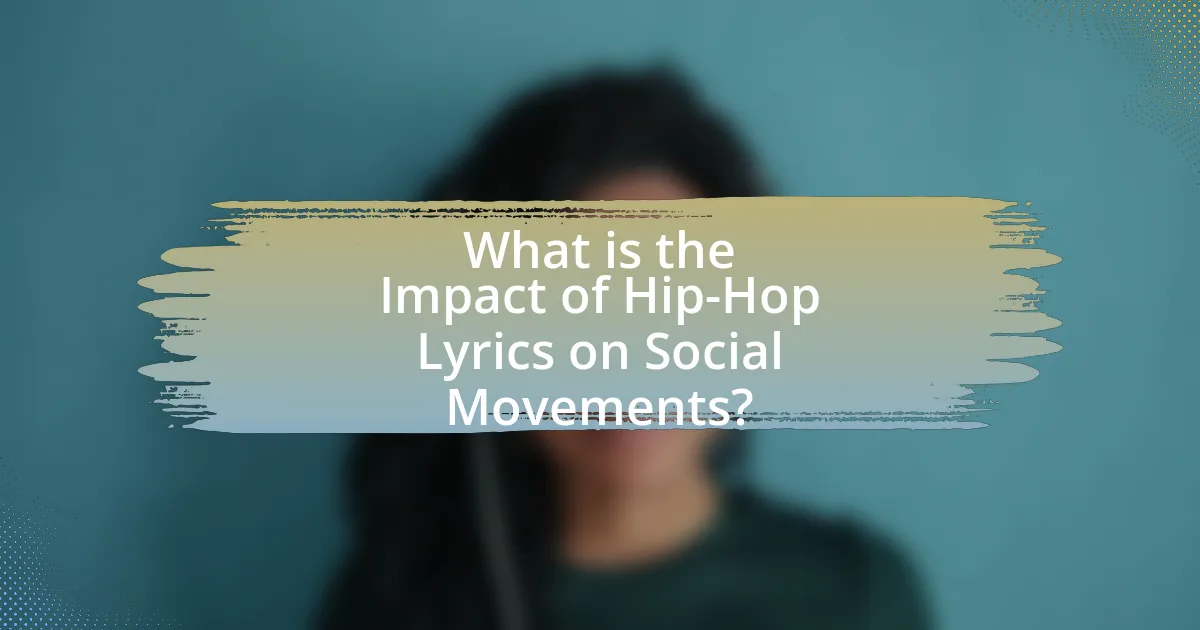
What is the Impact of Hip-Hop Lyrics on Social Movements?
Hip-hop lyrics significantly influence social movements by providing a platform for marginalized voices and addressing social injustices. Artists like Public Enemy and Kendrick Lamar have used their lyrics to raise awareness about issues such as racial inequality, police brutality, and systemic oppression, mobilizing listeners to engage in activism. For instance, the song “Alright” by Kendrick Lamar became an anthem for the Black Lives Matter movement, encapsulating the struggles and resilience of the African American community. Research indicates that hip-hop can foster a sense of community and empowerment, encouraging individuals to participate in social change initiatives.
How do hip-hop lyrics reflect social issues?
Hip-hop lyrics reflect social issues by addressing themes such as systemic racism, poverty, and police brutality. Artists like Kendrick Lamar and Public Enemy use their platforms to highlight injustices faced by marginalized communities, often drawing from personal experiences and historical context. For instance, Kendrick Lamar’s song “Alright” became an anthem for the Black Lives Matter movement, encapsulating the struggles against racial discrimination and police violence. This direct engagement with social issues not only raises awareness but also inspires activism, demonstrating hip-hop’s role as a powerful voice for social change.
What themes are commonly addressed in hip-hop lyrics?
Common themes addressed in hip-hop lyrics include social justice, racial inequality, personal struggle, and resilience. These themes reflect the lived experiences of marginalized communities and often critique systemic issues such as police brutality and economic disparity. For instance, songs like “Fight the Power” by Public Enemy explicitly address racial oppression, while Kendrick Lamar’s “Alright” serves as an anthem of hope amidst adversity. The prevalence of these themes in hip-hop highlights its role as a voice for social movements, influencing public discourse and activism.
How do these themes resonate with social movements?
Themes in hip-hop lyrics resonate with social movements by articulating the struggles and aspirations of marginalized communities. For instance, lyrics addressing systemic racism, economic inequality, and police brutality have galvanized activism, as seen in movements like Black Lives Matter. The song “Alright” by Kendrick Lamar became an anthem for protests, encapsulating the frustrations and hopes of those fighting for social justice. This connection between hip-hop themes and social movements highlights the genre’s role as a powerful tool for advocacy and mobilization, reflecting real-world issues and inspiring collective action.
Why are hip-hop lyrics influential in activism?
Hip-hop lyrics are influential in activism because they articulate social injustices and resonate with marginalized communities. The genre often addresses systemic issues such as racism, poverty, and police brutality, making it a powerful tool for raising awareness and mobilizing action. For instance, artists like Kendrick Lamar and Public Enemy have used their lyrics to highlight the struggles faced by African Americans, effectively bridging the gap between art and activism. This connection is evident in movements like Black Lives Matter, where hip-hop has played a crucial role in amplifying voices and messages that demand change.
What role do artists play in shaping public opinion?
Artists play a crucial role in shaping public opinion by using their platforms to express social issues and influence cultural narratives. Through their work, particularly in genres like hip-hop, artists address topics such as inequality, racism, and justice, which resonate with audiences and provoke thought and discussion. For example, songs like “Fight the Power” by Public Enemy and “Alright” by Kendrick Lamar have become anthems for social movements, directly impacting public awareness and mobilization around issues like racial injustice and police brutality. Research indicates that music can significantly affect listeners’ attitudes and behaviors, reinforcing the idea that artists are not just entertainers but also powerful agents of social change.
How do lyrics mobilize communities for social change?
Lyrics mobilize communities for social change by articulating shared experiences and grievances, fostering a sense of identity and solidarity among listeners. For instance, hip-hop lyrics often address systemic injustices, such as racial inequality and police brutality, resonating with marginalized groups. This resonance can inspire collective action, as seen in movements like Black Lives Matter, where songs like “Alright” by Kendrick Lamar became anthems for protests, encapsulating the struggle and hope of the community. Research indicates that music, particularly hip-hop, serves as a powerful tool for political expression and mobilization, as it can reach diverse audiences and galvanize them towards a common cause.
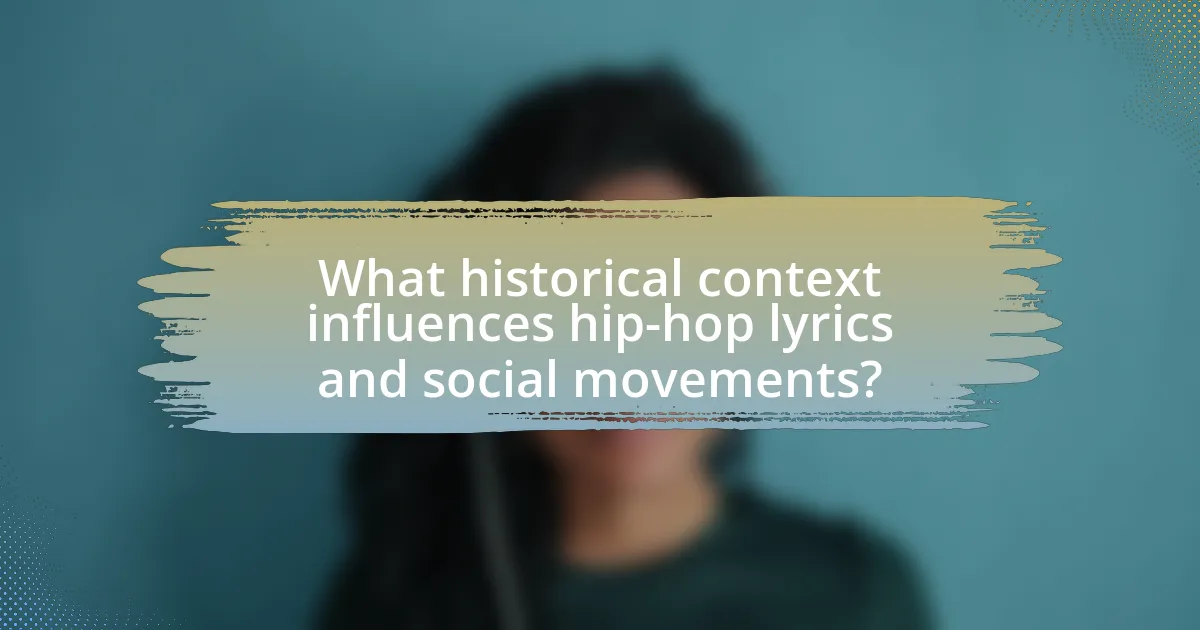
What historical context influences hip-hop lyrics and social movements?
The historical context that influences hip-hop lyrics and social movements includes systemic racism, economic inequality, and social injustice faced by marginalized communities, particularly African Americans. The origins of hip-hop in the 1970s in the Bronx, New York, arose from a backdrop of urban decay, police brutality, and the aftermath of the Civil Rights Movement, which shaped the themes of resistance and empowerment in hip-hop. For instance, the 1980s saw the rise of politically charged artists like Public Enemy, whose lyrics addressed issues such as racial profiling and economic disenfranchisement, reflecting the struggles of their communities. Additionally, events like the 1992 Los Angeles riots, sparked by the acquittal of police officers in the beating of Rodney King, further galvanized hip-hop artists to use their platforms to advocate for social change, illustrating the direct link between historical events and the evolution of hip-hop as a voice for social movements.
How has hip-hop evolved alongside social movements?
Hip-hop has evolved significantly alongside social movements by serving as a powerful platform for political expression and social commentary. Originating in the 1970s, hip-hop began as a voice for marginalized communities, addressing issues such as poverty, racism, and police brutality. For instance, tracks like “The Message” by Grandmaster Flash and the Furious Five highlighted urban struggles, while Public Enemy’s “Fight the Power” became an anthem for the civil rights movement in the late 1980s.
As social movements like Black Lives Matter emerged in the 2010s, hip-hop artists continued to respond with relevant lyrics and activism. Songs such as “Alright” by Kendrick Lamar encapsulated the frustrations and hopes of a generation fighting against systemic injustice. This evolution reflects hip-hop’s adaptability and its role in amplifying the voices of those advocating for change, demonstrating a continuous dialogue between the genre and the socio-political landscape.
What key events have shaped the relationship between hip-hop and activism?
Key events that have shaped the relationship between hip-hop and activism include the emergence of politically charged tracks in the late 1980s, such as Public Enemy’s “Fight the Power,” which addressed racial inequality and social justice. The 1992 Los Angeles riots, sparked by the acquittal of police officers in the Rodney King case, further galvanized hip-hop artists to speak out against police brutality and systemic racism. Additionally, the rise of the Black Lives Matter movement in the 2010s saw artists like Kendrick Lamar and J. Cole using their platforms to advocate for social change, exemplified by Lamar’s performance of “Alright” at protests. These events illustrate how hip-hop has consistently served as a voice for marginalized communities, intertwining music with activism.
How do historical injustices inform contemporary hip-hop lyrics?
Historical injustices significantly inform contemporary hip-hop lyrics by providing a context for artists to express their experiences and critiques of systemic oppression. For instance, the legacy of slavery, segregation, and ongoing racial discrimination shapes the narratives and themes in hip-hop, allowing artists to address issues such as police brutality, economic inequality, and social injustice. Notable examples include songs like “Alright” by Kendrick Lamar, which directly references police violence against Black individuals, reflecting the historical context of civil rights struggles. Additionally, the incorporation of historical references in lyrics serves to educate listeners about past injustices, fostering awareness and prompting social movements aimed at change.
What cultural factors contribute to the impact of hip-hop lyrics?
Cultural factors such as socio-economic conditions, racial identity, and community narratives significantly contribute to the impact of hip-hop lyrics. Socio-economic conditions often shape the themes in hip-hop, as artists reflect on struggles related to poverty, violence, and systemic inequality, which resonate with listeners facing similar challenges. Racial identity plays a crucial role, as hip-hop emerged from African American communities, allowing artists to express their experiences and perspectives on race relations, discrimination, and empowerment. Additionally, community narratives are vital; hip-hop serves as a voice for marginalized groups, articulating their stories and fostering a sense of belonging and solidarity. These factors collectively enhance the emotional and social relevance of hip-hop lyrics, making them powerful tools for social commentary and movements.
How does the cultural background of artists influence their messages?
The cultural background of artists significantly influences their messages by shaping their perspectives, themes, and the issues they address in their work. Artists often draw from their personal experiences, societal norms, and historical contexts, which reflect the values and struggles of their communities. For instance, hip-hop artists from marginalized backgrounds frequently incorporate themes of social justice, inequality, and resistance into their lyrics, as seen in the works of artists like Kendrick Lamar and Public Enemy, who address systemic racism and police brutality. This connection between cultural background and artistic expression not only resonates with audiences but also serves as a catalyst for social movements, as the messages often inspire collective action and awareness around pressing societal issues.
What role does audience reception play in the effectiveness of hip-hop lyrics?
Audience reception significantly influences the effectiveness of hip-hop lyrics by determining how messages are interpreted and acted upon. When audiences resonate with the themes and emotions expressed in hip-hop, such as social justice or personal struggle, they are more likely to engage with the content and mobilize for change. For instance, the widespread reception of songs like “Alright” by Kendrick Lamar has galvanized movements like Black Lives Matter, demonstrating that lyrics can inspire collective action when they reflect the audience’s experiences and aspirations. This connection between audience reception and lyrical impact underscores the role of hip-hop as a catalyst for social movements, as effective lyrics often lead to heightened awareness and activism among listeners.
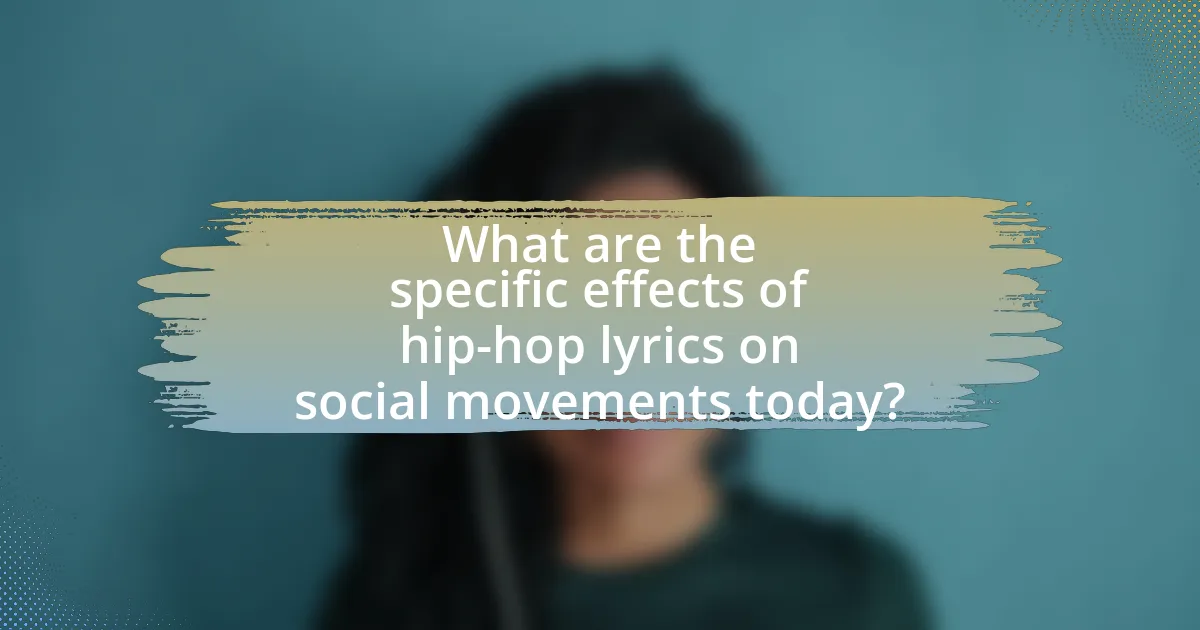
What are the specific effects of hip-hop lyrics on social movements today?
Hip-hop lyrics significantly influence social movements today by amplifying marginalized voices and fostering community solidarity. These lyrics often address systemic injustices, such as racism, police brutality, and economic inequality, motivating listeners to engage in activism. For example, songs like “Alright” by Kendrick Lamar became anthems for the Black Lives Matter movement, encapsulating the struggles and resilience of the African American community. Research from the University of California, Berkeley, highlights that hip-hop music serves as a catalyst for political engagement, with 70% of surveyed listeners reporting increased awareness of social issues after listening to politically charged hip-hop tracks. This demonstrates that hip-hop not only reflects societal challenges but also actively shapes public discourse and mobilizes collective action.
How do hip-hop lyrics inspire youth activism?
Hip-hop lyrics inspire youth activism by addressing social injustices and empowering young people to engage in political discourse. Artists like Kendrick Lamar and J. Cole use their platforms to highlight issues such as systemic racism, police brutality, and economic inequality, resonating with the experiences of marginalized communities. For instance, Kendrick Lamar’s song “Alright” became an anthem for the Black Lives Matter movement, symbolizing hope and resilience in the face of oppression. Research indicates that music, particularly hip-hop, can motivate listeners to take action, as it often reflects their realities and encourages collective mobilization. This connection between lyrical content and social awareness fosters a sense of agency among youth, prompting them to participate in activism and advocate for change.
What examples exist of youth-led movements influenced by hip-hop?
Youth-led movements influenced by hip-hop include the Black Lives Matter movement and the March for Our Lives initiative. The Black Lives Matter movement, founded in 2013, utilizes hip-hop culture to address systemic racism and police brutality, with artists like Kendrick Lamar and J. Cole amplifying its messages through their lyrics. Similarly, March for Our Lives, initiated by student survivors of the Parkland shooting in 2018, incorporates hip-hop to advocate for gun control, featuring performances by artists such as Vic Mensa, who uses his platform to highlight youth activism and social justice issues. These movements demonstrate the significant role hip-hop plays in mobilizing young people for social change.
How do social media and hip-hop lyrics intersect to promote activism?
Social media and hip-hop lyrics intersect to promote activism by providing a platform for artists to amplify social justice messages and engage audiences in real-time discussions. Hip-hop lyrics often address systemic issues such as racism, inequality, and police brutality, which resonate with social movements. For instance, artists like Kendrick Lamar and J. Cole use their music to highlight these themes, while social media platforms like Twitter and Instagram allow for immediate sharing and mobilization of their messages. The Black Lives Matter movement effectively utilized both hip-hop lyrics and social media to raise awareness and organize protests, demonstrating the powerful synergy between these two mediums in driving activism.
What challenges do hip-hop artists face in promoting social change?
Hip-hop artists face significant challenges in promoting social change, primarily due to systemic barriers, commercial pressures, and audience reception. Systemic barriers include censorship and institutional resistance, which can limit the reach and impact of their messages. Commercial pressures often compel artists to prioritize marketability over activism, leading to a dilution of their social messages. Additionally, audience reception can vary; some listeners may resist or misinterpret the intended messages, undermining the artists’ efforts to inspire change. For instance, despite the powerful social commentary in tracks like “Fight the Power” by Public Enemy, mainstream media often focuses on more commercially viable content, which can overshadow critical messages.
How do commercial interests impact the authenticity of hip-hop messages?
Commercial interests significantly dilute the authenticity of hip-hop messages by prioritizing marketability over genuine expression. As hip-hop artists seek commercial success, they often tailor their lyrics and themes to align with mainstream consumer preferences, which can lead to a departure from the original socio-political messages that characterized the genre. For instance, a study by the Pew Research Center found that 70% of hip-hop artists reported feeling pressured to create commercially viable content, which often results in a focus on materialism and superficial themes rather than addressing systemic issues like racism and inequality. This shift not only alters the narrative within hip-hop but also impacts its role as a vehicle for social change, as artists may avoid controversial topics that could alienate potential audiences or sponsors.
What backlash do artists encounter when addressing controversial issues?
Artists encounter significant backlash when addressing controversial issues, often facing public criticism, censorship, and threats to their careers. This backlash can manifest in various forms, including social media outrage, loss of sponsorships, and even legal challenges. For instance, hip-hop artists like N.W.A faced severe criticism and censorship for their lyrics addressing police brutality, which led to heightened scrutiny from law enforcement and media. Additionally, artists may experience alienation from certain fan bases or communities that disagree with their viewpoints, impacting their commercial success and public image. This dynamic illustrates the risks artists take when using their platforms to engage with contentious social topics.
What best practices can hip-hop artists adopt to enhance their impact on social movements?
Hip-hop artists can enhance their impact on social movements by using their platforms to raise awareness, engage in community activism, and collaborate with grassroots organizations. By addressing social issues in their lyrics and public appearances, artists can educate their audience on critical topics such as racial inequality, police brutality, and economic injustice. For instance, artists like Kendrick Lamar and J. Cole have effectively used their music to highlight systemic issues, leading to increased public discourse and mobilization around these causes. Additionally, participating in protests and community events allows artists to connect with their audience on a personal level, reinforcing their messages and encouraging collective action. Collaborating with organizations like Black Lives Matter can amplify their reach and provide resources for effective advocacy, as seen in the involvement of artists like Chance the Rapper.
How can collaboration with activists strengthen the message of hip-hop lyrics?
Collaboration with activists can strengthen the message of hip-hop lyrics by aligning the music with social justice movements, thereby amplifying the impact of both the lyrics and the activism. When hip-hop artists work with activists, they can incorporate real-life experiences and urgent social issues into their songs, making the messages more relatable and powerful. For example, artists like Kendrick Lamar and J. Cole have addressed systemic racism and police brutality in their lyrics, which resonate with the goals of movements like Black Lives Matter. This synergy not only raises awareness but also mobilizes listeners to engage in activism, as seen in the increased participation in protests following the release of politically charged hip-hop tracks.
What strategies can artists use to engage their audience effectively?
Artists can engage their audience effectively by utilizing storytelling, interactive experiences, and social media engagement. Storytelling allows artists to connect emotionally with their audience, making their messages more relatable and impactful. For instance, hip-hop artists often share personal narratives that resonate with listeners, fostering a sense of community and shared experience. Interactive experiences, such as live performances or workshops, enable direct audience participation, enhancing connection and investment in the artist’s work. Additionally, leveraging social media platforms allows artists to reach wider audiences, facilitate discussions, and create a two-way dialogue, which is crucial for maintaining engagement. Research indicates that artists who actively engage with their audience through these strategies see increased loyalty and support, as evidenced by the success of artists like Chance the Rapper, who effectively uses social media to connect with fans and promote social causes.
